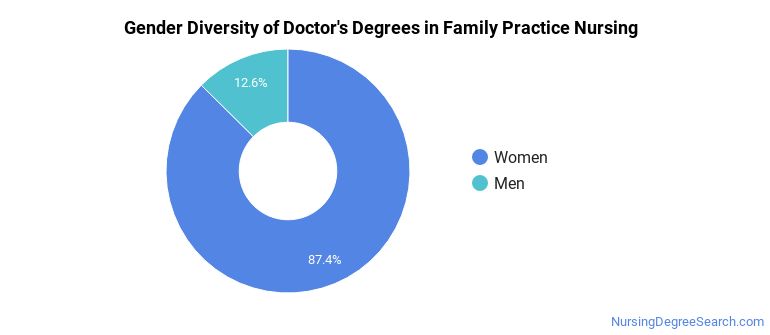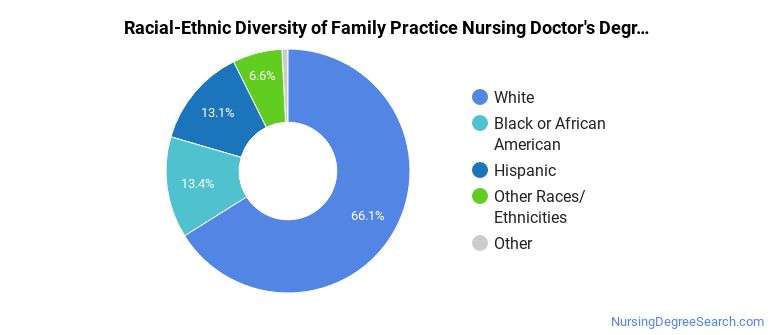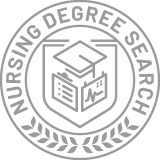Doctor’s Degrees in Family Practice Nurse/Nursing
Education Levels of Family Practice Nursing Majors
During the most recent year for which data is available, 683 people earned their doctor's degree in family practice nursing. This makes it the 5th most popular doctor's degree program in the country.
The following table shows the number of diplomas awarded in family practice nursing at each degree level.
| Education Level | Number of Grads |
|---|---|
| Master’s Degree | 13,197 |
| Graduate Certificate | 1,092 |
| Doctor’s Degree | 683 |
| Bachelor’s Degree | 181 |
| Undergraduate Certificate | 1 |
Earnings of Family Practice Nursing Majors With Doctor’s Degrees
We are unable to calculate the median earnings for family practice nursing majors with their doctor's degree due to lack of data.
Student Debt
The data on debt ranges for family practice nursing majors who have their doctor's degree is not available.
Student Diversity
More women than men pursue their doctor's degree in family practice nursing. About 87.4% of graduates with this degree are female.
| Gender | Number of Grads |
|---|---|
| Men | 86 |
| Women | 597 |

The racial-ethnic distribution of family practice nursing doctor’s degree students is as follows:
| Race/Ethnicity | Number of Grads |
|---|---|
| Asian | 58 |
| Black or African American | 84 |
| Hispanic or Latino | 82 |
| White | 413 |
| International Students | 5 |
| Other Races/Ethnicities | 41 |

Most Popular Family Practice Nursing Programs for Doctor’s Degrees
There are 74 colleges that offer a doctor’s degree in family practice nursing. Learn more about the most popular 20 below:
The most popular school in the United States for family practice nursing students seekinga doctor's degree is Creighton University. Roughly 8,700 attend the school each year. The average in-state tuition for full-time undergraduates is $45,000 per year, while in-state graduate students, on average, pay $17,676 per year. During the most recent year for which we have data, 42 people received their doctor's degree in family practice nursing from Creighton. Of these students, 96% were women and 20% were members of underrepresented racial-ethnic groups.
Seattle University comes in at #2 on our list of the most popular colleges offering doctor's degrees in family practice nursing. Roughly 7,000 attend the school each year. The average in-state tuition for full-time undergraduates is $53,235 per year, while in-state graduate students, on average, pay $15,012 per year. During the most recent year for which we have data, 37 people received their doctor's degree in family practice nursing from Seattle U. Around 46% of these students were from an underrepresented racial-ethnic group, and 80% were women.
Samford University comes in at #3 on our list of the most popular colleges offering doctor's degrees in family practice nursing. Roughly 5,700 attend the school each year. The average in-state tuition for full-time undergraduates is $37,144 per year, while in-state graduate students, on average, pay $21,904 per year. During the most recent year for which we have data, 35 people received their doctor's degree in family practice nursing from Samford. About 83% of this group were women, and 33% were students from an underrepresented racial-ethnic group.
Viterbo University is the 4th most popular school in the nation for students seeking a doctor's degree in family practice nursing. Roughly 2,500 attend the school each year. The average in-state tuition for full-time undergraduates is $31,600 per year, while in-state graduate students, on average, pay $10,080 per year. During the most recent year for which we have data, 28 people received their doctor's degree in family practice nursing from Viterbo.
Maryville University of Saint Louis is the 6th most popular school in the nation for students seeking a doctor's degree in family practice nursing. Each year, around 10,900 students seeking various degrees attend the university. The average in-state tuition for full-time undergraduates is $24,766 per year, while in-state graduate students, on average, pay $14,346 per year. During the most recent year for which we have data, 20 people received their doctor's degree in family practice nursing from Maryville U. Around 29% of these students were from an underrepresented racial-ethnic group, and 88% were women.
The 7th most popular school in the country for family practice nursing majors who are seeking their doctor's degree is Montana State University. Roughly 16,200 attend the school each year. The average in-state tuition for full-time undergraduates is $6,056 per year, while in-state graduate students, on average, pay $5,451 per year. During the most recent year for which we have data, 18 people received their doctor's degree in family practice nursing from MSU Bozeman. About 78% of this group were women, and 22% were students from an underrepresented racial-ethnic group.
The 8th most popular school in the country for family practice nursing majors who are seeking their doctor's degree is Sacred Heart University. Each year, around 9,300 students seeking various degrees attend the university. The average in-state tuition for full-time undergraduates is $48,160 per year, while in-state graduate students, on average, pay $34,060 per year. During the most recent year for which we have data, 16 people received their doctor's degree in family practice nursing from Sacred Heart. About 94% of this group were women, and 31% were students from an underrepresented racial-ethnic group.
University of Mary is the 8th most popular school in the nation for students seeking a doctor's degree in family practice nursing. Roughly 3,700 attend the school each year. The average in-state tuition for full-time undergraduates is $19,084 per year, while in-state graduate students, on average, pay $10,620 per year. During the most recent year for which we have data, 16 people received their doctor's degree in family practice nursing from UMary.
North Dakota State University - Main Campus is the 8th most popular school in the nation for students seeking a doctor's degree in family practice nursing. Roughly 12,800 attend the school each year. The average in-state tuition for full-time undergraduates is $9,309 per year, while in-state graduate students, on average, pay $7,585 per year. During the most recent year for which we have data, 16 people received their doctor's degree in family practice nursing from North Dakota State University.
The 11th most popular school in the country for family practice nursing majors who are seeking their doctor's degree is Valparaiso University. Roughly 3,100 attend the school each year. The average in-state tuition for full-time undergraduates is $45,136 per year, while in-state graduate students, on average, pay $12,222 per year. During the most recent year for which we have data, 15 people received their doctor's degree in family practice nursing from Valpo. Of these students, 75% were women and 13% were members of underrepresented racial-ethnic groups.
Loyola University New Orleans comes in at #12 on our list of the most popular colleges offering doctor's degrees in family practice nursing. Roughly 4,400 attend the school each year. The average in-state tuition for full-time undergraduates is $45,280 per year, while in-state graduate students, on average, pay $20,524 per year. During the most recent year for which we have data, 14 people received their doctor's degree in family practice nursing from Loyola New Orleans. Of these students, 80% were women and 80% were members of underrepresented racial-ethnic groups.
Holy Family University is the 12th most popular school in the nation for students seeking a doctor's degree in family practice nursing. The average in-state tuition for full-time undergraduates is $32,768 per year, while in-state graduate students, on average, pay $13,817 per year. During the most recent year for which we have data, 14 people received their doctor's degree in family practice nursing from Holy Family. Around 20% of these students were from an underrepresented racial-ethnic group, and 100% were women.
University of San Francisco is the 14th most popular school in the nation for students seeking a doctor's degree in family practice nursing. Roughly 10,000 attend the school each year. The average in-state tuition for full-time undergraduates is $57,670 per year, while in-state graduate students, on average, pay $29,070 per year. During the most recent year for which we have data, 13 people received their doctor's degree in family practice nursing from USFCA. Around 50% of these students were from an underrepresented racial-ethnic group, and 92% were women.
University of the Incarnate Word comes in at #14 on our list of the most popular colleges offering doctor's degrees in family practice nursing. Each year, around 7,900 students seeking various degrees attend the university. The average in-state tuition for full-time undergraduates is $33,700 per year, while in-state graduate students, on average, pay $19,800 per year. During the most recent year for which we have data, 13 people received their doctor's degree in family practice nursing from UIW. Of these students, 88% were women and 75% were members of underrepresented racial-ethnic groups.
The 16th most popular school in the country for family practice nursing majors who are seeking their doctor's degree is Loma Linda University. Roughly 4,400 attend the school each year. The average in-state tuition for full-time undergraduates is $24,000 per year, while in-state graduate students, on average, pay $29,000 per year. During the most recent year for which we have data, 12 people received their doctor's degree in family practice nursing from Loma Linda University. About 75% of this group were women, and 50% were students from an underrepresented racial-ethnic group.
Fairfield University comes in at #16 on our list of the most popular colleges offering doctor's degrees in family practice nursing. Roughly 5,500 attend the school each year. The average in-state tuition for full-time undergraduates is $55,510 per year, while in-state graduate students, on average, pay $20,625 per year. During the most recent year for which we have data, 12 people received their doctor's degree in family practice nursing from Fairfield U. Of these students, 92% were women and 15% were members of underrepresented racial-ethnic groups.
Wayne State University comes in at #16 on our list of the most popular colleges offering doctor's degrees in family practice nursing. The average in-state tuition for full-time undergraduates is $13,660 per year, while in-state graduate students, on average, pay $18,301 per year. During the most recent year for which we have data, 12 people received their doctor's degree in family practice nursing from Wayne State. About 100% of this group were women, and 13% were students from an underrepresented racial-ethnic group.
The 16th most popular school in the country for family practice nursing majors who are seeking their doctor's degree is University at Buffalo. Each year, around 32,300 students seeking various degrees attend the university. The average in-state tuition for full-time undergraduates is $7,070 per year, while in-state graduate students, on average, pay $11,310 per year. During the most recent year for which we have data, 12 people received their doctor's degree in family practice nursing from University at Buffalo. Around 29% of these students were from an underrepresented racial-ethnic group, and 88% were women.
Explore Major by State
Alabama
Arkansas
Connecticut
Florida
Idaho
Iowa
Louisiana
Massachusetts
Mississippi
Nebraska
New Jersey
North Carolina
Oklahoma
Rhode Island
Tennessee
Vermont
West Virginia
Related Majors
Below are some popular majors that are similar to family practice nursing that offer doctor’s degrees.
| Major | Annual Degrees Awarded |
|---|---|
| Nursing Practice | 7,474 |
| Nurse Anesthetist | 1,403 |
| Registered Nursing | 976 |
| Nursing Science | 927 |
| Nursing Administration | 725 |
References
*The racial-ethnic minority student count is calculated by taking the total number of students and subtracting white students, international students, and students whose race/ethnicity was unknown. This number is then divided by the total number of students at the school to obtain the percentage of racial-ethnic minorities.
- College Factual
- National Center for Education Statistics
- O*NET Online
- Bureau of Labor Statistics
- Image Credit: By Aleksahgabrielle under License
More about our data sources and methodologies.
















